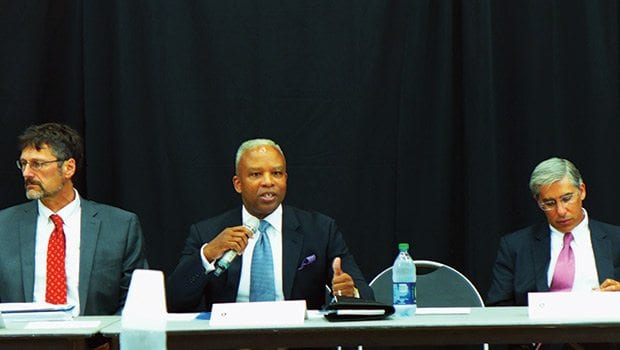Governor’s task force seeks community views on unemployment inequality

Community activists and representatives of community-based organizations came before the governor’s task force on unemployment inequality last week to give testimonies on challenges to employment and suggest steps for addressing them. The public hearing, held at Roxbury Community College, was the first of six planned sessions, and included speakers from the Institute for Career Transition, Boston Center for Independent Living, Boston Workers Alliance, People’s Academy and Massachusetts Diversity Coalition.
The unemployment rate in Massachusetts is at a low, dropping to 4.7 percent in July, which is below the national average. But among blacks, Latinos, Native Americans, recently-returned veterans and people with disabilities, unemployment hovers around 7-12 percent.
Based on their experiences, certain themes emerged through speakers’ statements, including discrimination against older people and people with disabilities, bias against those with CORI records, racism and difficulty getting a foot in the door after a prolonged period of unemployment. Also cited: getting companies to recognize the value those with non-standard resumes, seek out diversity and understand how to accommodate the disabilities or diverse needs of their employees.
Charlotte Golar Richie, commissioner of Mass Commission Against Discrimination, said over 81.8% of the 3,127 cases filed with MCAD last year alleged discrimination in employment regarding promotion, termination, demotion, hours and quality of assignments.
The task force on Economic Opportunity for Populations Facing Chronically High Rates of Unemployment explores issues and strategies and is set to present policy change ideas on November 15.
Exclusionary hiring practices and inaccessible workplaces
Many in the disabled community view potential employers as excluding them from consideration solely due to their disability, not their competence on the job, said Sarah Kaplan, transition internship coordinator for the Boston Center for Independent Living.
“As a person with a disability that’s visible,” said Kaplan, who uses a wheelchair, “I never disclose before an interview. Ever. … I don’t check the box. … [because] I want my resume to speak for me.”
Another hurdle is that many corporate settings are not sufficiently accessible.
“I’ve definitely gotten to interviews where there are steps when I open the door, and I’ve had to have interviews in closets or hallways because I can’t get to where I need to go,” said Kaplan.
Kaplan said that when she sent youth to internships, primarily at global nonprofits, she found many employers were unaware of how to provide useful accommodations to employees with disabilities, and said companies often regarded people with disabilities as a liability and so avoided hiring them.
William F. O’Donnell, who studied unemployment in the blind population for his master’s in public affairs, said that the job application itself could be a challenge.
“There is no real standard for universal access for people with disabilities to apply for jobs online or elsewhere,” he said.
Abilism affects older populations as well: Kit Hayes, a career transition coach who focuses on serving clients over 50, said there is often not enough consideration for the physical needs of older workers.
Benefits bind
Many said that the structure and process of disability benefits work can create perverse incentives, causing people to avoid jobs out of fear that they would lose their benefits and ultimately make less money by working.
“It is hard to forgo benefits and leave it to the great unknown. It is like a padded jail cell. We feel locked in the cell,” said John Winske, director of the Disability Policy Consortium.
Stephen Yerardi, an assistant technology trainer who works on a subcontractor basis, said that at one point he realized he would make more money if he stopped working and relied on benefits instead.
Under Supplemental Security Income people with both disabilities and low income and limited resource can be eligible to receive monthly payments. To qualify to receive SSI, children under 18 may only earn up to $1,090 a month in 2015, according to a report by the Social Security Administration.
Staying in school allows young people to earn more and still qualify: a person under 22 who regularly attends school may exclude $1,780 of their monthly earnings for up to $7,180 per year when submitting their income for SSI.
This fear of benefit loss encourages many with disabilities to seek extended education instead of jobs, said Bill Henning, executive director of BCIL.
“Kids get social serviced to death. They don’t get work, then they go on and get overeducated and overeducated, and it’s almost a cycle. Do people who are 28 years old want to do the entry-level work? Is someone going to offer them a job?” He said that the longer these kids wait, the less likely they are to enter the workforce.
Youths with disabilities and their parents need better education about their benefits and what benefit options exist for them, said Kaplan. “They don’t understand the Ticket to Work program or the minimum amount of money someone can make before their benefits are affected.”
Throughout the hearing, in addition to calls for providing greater education about disability benefits and realigning incentives so that those who work are not losing money, several speakers said state government ought to incorporate affirmative action quotas for employees with disabilities into the contracting requirements.
CORI
Employers in Massachusetts are not legally allowed to automatically reject applicants based on their having a criminal record, unless they can prove that such a rejection policy is necessary to the business.
T. Michael Thomas, founder and president of the People’s Academy, said that in effect, employers still judge applicants based on CORIs.
Curtis Rollins, director of organizing at the Boston Workers Alliance, said that even those with no actual “criminal” histories were affected: often employers would assume that the presence of a CORI indicated conviction and bypass the person for hire. They would not read the full CORI to find if the charges were dismissed, causing many who had been accused to be blocked from opportunities. Employer misunderstanding of CORI laws is a significant issue in his community, he said.
Former-senator Dianne Wilkerson said that a significant portion of working-able black and Latino men have CORIs and that this issue contributes further to racial inequality.
Racism
“White high school graduates have higher employment rates that black and Latino college graduates. For us to say race doesn’t play a role would be naïve because it does,” said Wilkerson.
Priscilla Flint, co-founder of the Black Economic Justice Institute, was among those to say racism was rife in the unions.
Ageism
Several speakers said they felt their age was judged as a negative when they applied for jobs.
Hayes said that in her work assisting older clients she saw a lot of wasted potential because talented workers were not considered for jobs or were the first to be laid off, due to their age.
“Their resumes automatically get screened out with no human eyes ever seeing them. That’s how those tracking systems work that the companies have,” she said.
Many of Haye’s clients had been searching for jobs for a year or two. Sometimes the length of search causes them give up, run through their retirement savings or take several low-level jobs
“A person at 55 may not get a job again,” said Palma McLaughlin, who has been seeking employment for over 5 years.
Hayes suggested a PR campaign could alert companies to the potential of overlooked demographics.
Non-standard resumes
“If you can’t check off a box that says college degree … they don’t know what to do with you,” said McLaughlin. It is important employers realize that non-standard experiences can still give someone credentials, she said.
She said there is a strong bias against resumes that show long-term employment gaps and that employers often do not interpret the value of volunteer experience. A stay-at-home mom with a knack at running school fundraisers, for instance, might not be viewed as possessing job-ready experience or skills.
A path to improvement: McLaughlin said nonprofits should be educated on how to frame volunteer jobs with professional keywords that employers would recognize.
Returning veterans also face challenges explaining how their military experience relates to civilian jobs, she added.
Suggestions for the future
Many said business needed to be educated on the value posed by marginalized workers and on lurking biases in their hiring practices. There also was a call for the state government to set diversity hiring goals in the contract bidding process.
Speakers pointed to YouthBuild Boston and People’s Academy as examples of intermediary groups that effectively engage with underserved communities.
Ronald L. Walker, II, secretary of Labor and Workforce Development and head of the taskforce, said that it also sought to learn of locally successful practices that could serve as models for larger scale efforts.
Since its formation in March, the task force had been meeting with businesses to understand the demand side of the situation, he said.
In September and October, the task force will hold five more public hearing sessions. They will be offered in Springfield, New Bedford, Lowell, Worcester and Boston.






